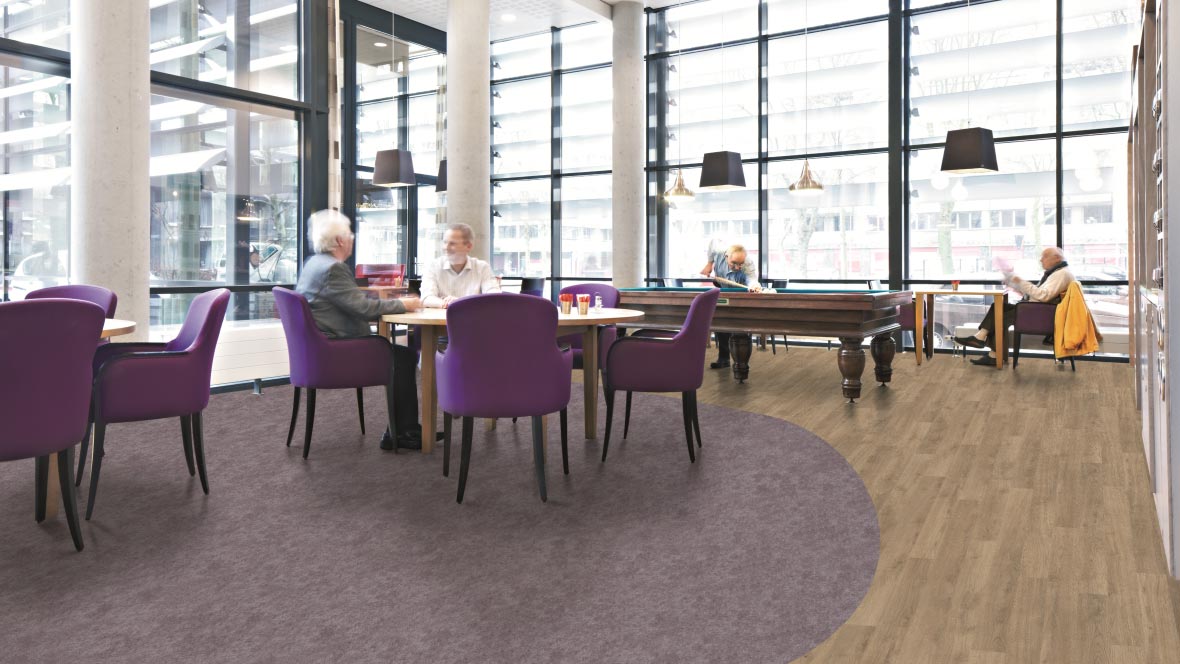Reducing slips in dementia-inclusive environments

For people living with dementia, a slip, trip or fall can have a serious impact, not only on their physical health but their confidence and mobility. Here, Garry Bateman, Head of Technical Sales and Support at Forbo Flooring Systems UK and CFA President, looks at why it is so important to ‘design for the mind’ and the key factors to consider when specifying flooring.
There is an estimated 850,000 people in the UK living with dementia, a number which is predicted to reach more than 1 million by 2025 and 2 million by 2051. However, dementia is often misunderstood, and people will commonly assume that it only affects a person’s memory or cognitive skills. There is also a misconception that it is one condition. In fact, dementia is an umbrella term that covers a range of conditions that damage the nerve cells in the brain and affects how messages are sent to and from the brain. This could mean someone living with dementia experiences the world around them very differently and as such, it may become more difficult and hazardous to navigate.
 Flooring, as one of the largest single surfaces in a building and the one that people interact with most often, has an important role in creating a safe environment. Everything from the pattern, finish and material must be considered carefully to avoid disorientation, slips, trips and falls.
Flooring, as one of the largest single surfaces in a building and the one that people interact with most often, has an important role in creating a safe environment. Everything from the pattern, finish and material must be considered carefully to avoid disorientation, slips, trips and falls.
With dementia and other age-related conditions affecting movement, motor control and balance, it is important to select a high-quality sustainable slip resistant flooring for areas where there is an increased risk. For example, in wet areas such as bathrooms, toilets and showers, slip resistant flooring is crucial. Specially designed, sustainable safety flooring slip resistant finish can help prevent accidents even where high levels of moisture are present. In fact, Forbo’s Step range features slip resistant particles throughout the wear layer of the flooring to provide a guaranteed sustainable lifetime performance.
In more general areas within care environments requiring softer flooring options, such as living spaces, social areas and dining rooms, the need to maximise ease of cleaning and hygiene must be considered alongside the need to ensure slip resistance. Here electrostatically flocked flooring such as Forbo’s Flotex can provide a solution that is comfortable, slip resistant and easy to clean, as well as providing the sound absorbing performance of textile flooring.

For dementia-inclusive environments it’s recommended that floors with a matt appearance are used throughout. Flecked, striped or patterned effects or flooring that incorporates a logo should be avoided, as these designs can cause illusions or visual hallucinations that lead people to walk over the surface differently or respond to hazards that are not present – potentially resulting in a slip or fall. For example, a circle in the floor covering could appear as a hole in the ground and transition strips could even be perceived as a step.
 Finally, it is common for people with dementia to perceive colours, tonal variances and textures as something they are not. It is therefore important that tonal contrast between different surfaces and between adjacent areas of flooring are considered carefully to prevent the perception of a change in level (that is not really there) and so reduce the risk of falls. The tonal contrast of a material is assessed using the Light Reflectance Values (LRV) and the LRV of adjoining floors should ideally be within eight degrees of each other (less is better) and no more than 10 degrees.
Finally, it is common for people with dementia to perceive colours, tonal variances and textures as something they are not. It is therefore important that tonal contrast between different surfaces and between adjacent areas of flooring are considered carefully to prevent the perception of a change in level (that is not really there) and so reduce the risk of falls. The tonal contrast of a material is assessed using the Light Reflectance Values (LRV) and the LRV of adjoining floors should ideally be within eight degrees of each other (less is better) and no more than 10 degrees.
This article was written by Forbo, who has partnered with the Dementia Services Development Centre, which is an international centre that draws on 25 years of global research and practice, to identify which floor coverings in our portfolio can contribute to improving the quality of life for people with dementia. There are more than 800 Forbo products that have been accredited across the Class 1a, 1b and 2 rating system[1]. This rating system is based on the tonal contrast and pattern of products, which determines their suitability for use. Forbo has had members in the UKSRG for many years and the expertise of Garry Bateman and Paul Rogers (now independent consultant) are highly valued during the continuous improvement work of the UKSRG to reduce slips and trips. (Published 06/2020, reviewed 08/2021)
To find out more about creating dementia-inclusive environments, visit Forbo’s website: www.forbo-flooring.co.uk/dementia
[1] This rating system is based on the tonal contrast and pattern of products, which determines their suitability for use in dementia care environments. 1a is flooring that is plain and can be used in dementia care environments indiscriminately, 1b is the category of semi-plain flooring that can be used throughout a dementia care facility, whilst category 2 is patterned products that can be used, but caution must be exercised.
Become a member and get involved in the UK Slip Resistance Group
More